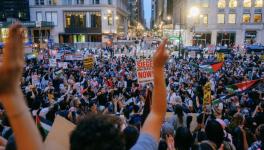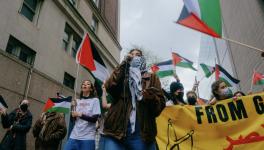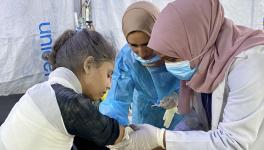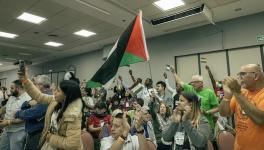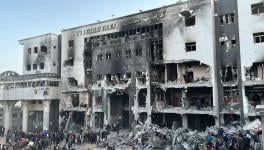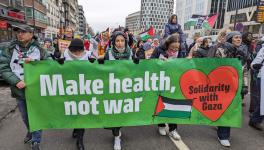Gaza’s Health Workers and Patients Face Unprecedented Mental Health Crisis

Devastation in Gaza Photo: Fuad Khamash/PRCS
“We are alive, but we are not okay,” said Dr. Ruba Suliman, describing the reality faced by health workers in Gaza during a conversation with Doctors Without Borders (MSF). A recent MSF report echoes her sentiment, revealing that the mental health of health workers in the Gaza Strip has deteriorated to unprecedented levels. Continuous exposure to bombardments, displacement, and the looming threat of a ground invasion in Rafah have left health workers and thousands of patients deeply traumatized.
Over the past six months, Palestinian health workers have been overwhelmed by a relentless influx of trauma patients suffering from injuries inflicted in Israeli attacks, including limb fractures and severe burns. They also face impossible decisions daily, such as who receives surgery without anesthesia, and whether to risk targeting by Israeli Occupying Forces (IOF) or abandon their patients during evacuations of medical facilities.
These choices, coupled with the trauma, are likely to leave lasting scars, warns the MSF report. Health workers are already reporting high levels of anxiety, insomnia, depression, and intrusive thoughts. Nearly 500 health workers have been killed in Israeli attacks. “There isn’t even a safe place in people’s minds. They live in a state of constant alert,” noted Amparo Villasmil of MSF.
The psychological impact extends to patients and displaced individuals seeking refuge in Gaza’s hospitals. MSF staff report that family members of patients suffering from pre-existing severe mental health issues have resorted to excessive sedation to keep them safe and prevent them from causing harm, due to the closure of specialized services amidst attacks on healthcare.
Public health concerns grow amidst millions of tons of debris
The never-ending buzzing of drones creates a constant backdrop of the testimonies collected by different health organizations, further exacerbating the psychological strain. This occurs amid near-apocalyptic conditions, with Gaza’s water and sanitation infrastructure on the brink of collapse and vast amounts of debris from destroyed infrastructure, as reported by the United Nations. According to the UN, the destruction of roads and buildings in Gaza has led to the accumulation of around 37.5 million tons of such debris.
For more than a million people cramped up in Rafah, living in tents and makeshift shelters, accessing healthcare has become nearly impossible. The destruction of Gaza’s hospitals and the intensity of Israeli attacks have forced many facilities to either effectively convert into trauma response centers or close due to sieges by the IOF. This has led to an increased risk of infections and other complications for treatable conditions.
Pressure on existing healthcare capacities soars
Young children and pregnant women are particularly vulnerable. MSF teams report a rise in urinary infections, anemia, and bleeding among the estimated 50,000 pregnant women in Gaza, many of whom received no prenatal care since the attacks began on October 7. The Emirati Hospital in Rafah, one of the few remaining facilities offering maternal care, is conducting around 100 deliveries daily: five times what it used to conduct before October 7. The overflow has forced the hospital to convert its parking lot into a makeshift postpartum area, adding 26 beds to accommodate the surge.
Despite these efforts, there are not enough beds. New mothers often return to their tents shortly after childbirth, where they have no access to water, food, or privacy. Nutritional status for mothers and babies is deteriorating daily, complicating breastfeeding efforts. Finding infant formula is equally difficult. Not only is there no water to prepare the formula with, but the price has gone up two to three times compared to before.
The pressure on other health services is equally intense. MSF teams in just two health centers manage over 5,000 consultations weekly, with no capability for referral to specialized care. Thus, Israel is not only killing Palestinians through direct attacks, but also by erasing crucial chunks of the health system, leaving thousands of people suffering from cancer, kidney disease, or diabetes to die in silence.
People’s Health Dispatch is a fortnightly bulletin published by the People’s Health Movement and Peoples Dispatch. For more articles and to subscribe to People’s Health Dispatch, click here.
Get the latest reports & analysis with people's perspective on Protests, movements & deep analytical videos, discussions of the current affairs in your Telegram app. Subscribe to NewsClick's Telegram channel & get Real-Time updates on stories, as they get published on our website.









